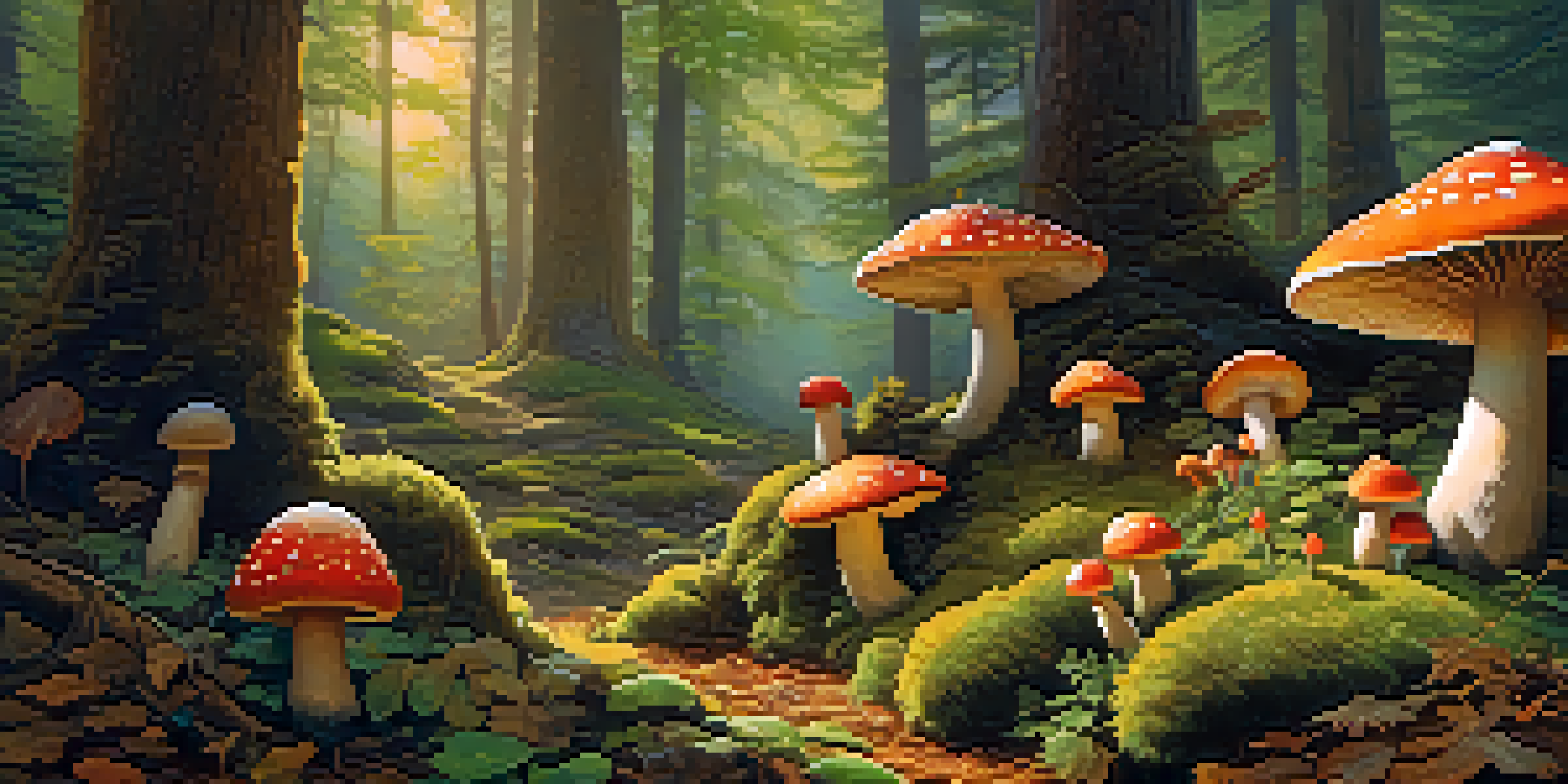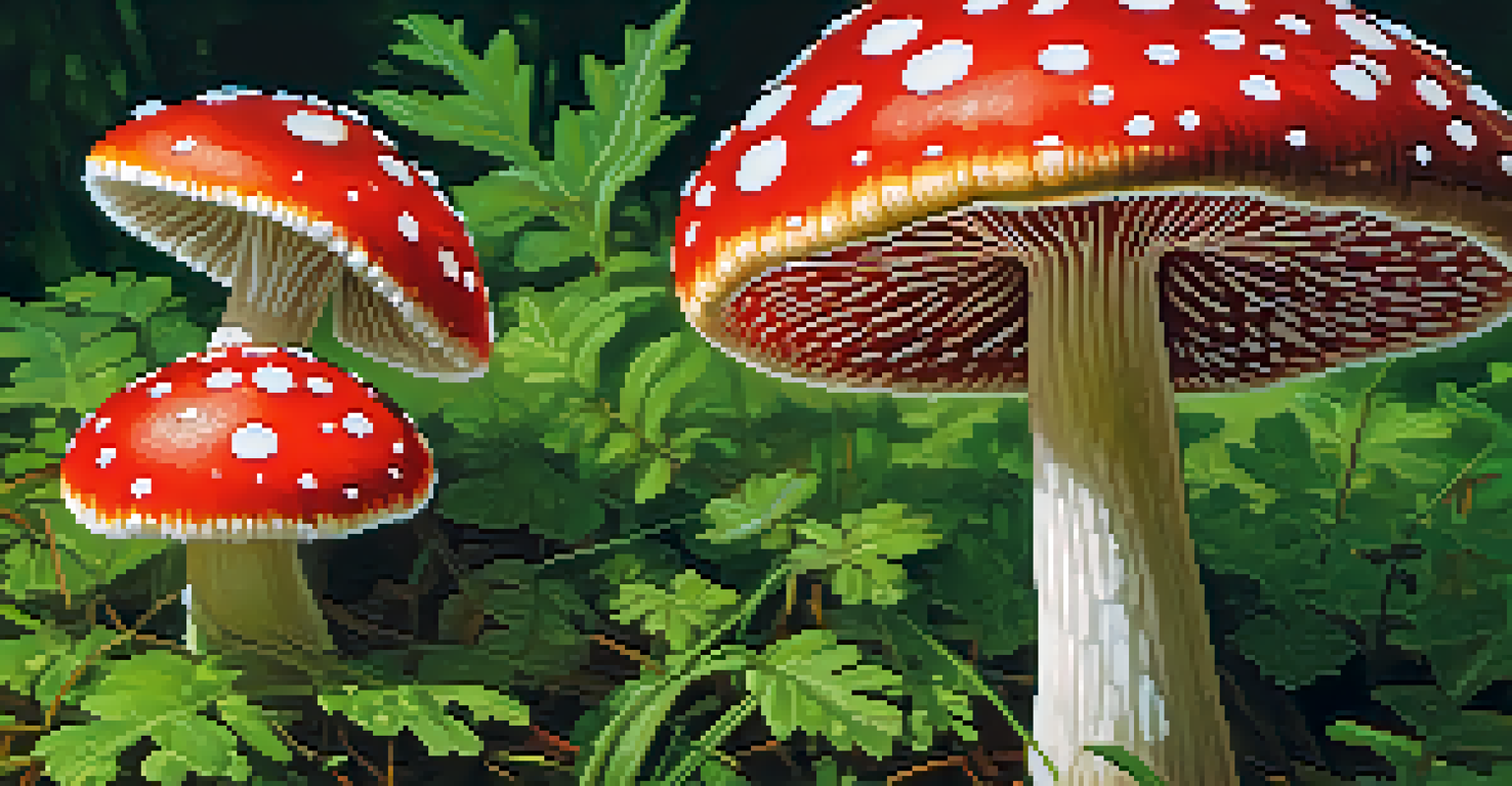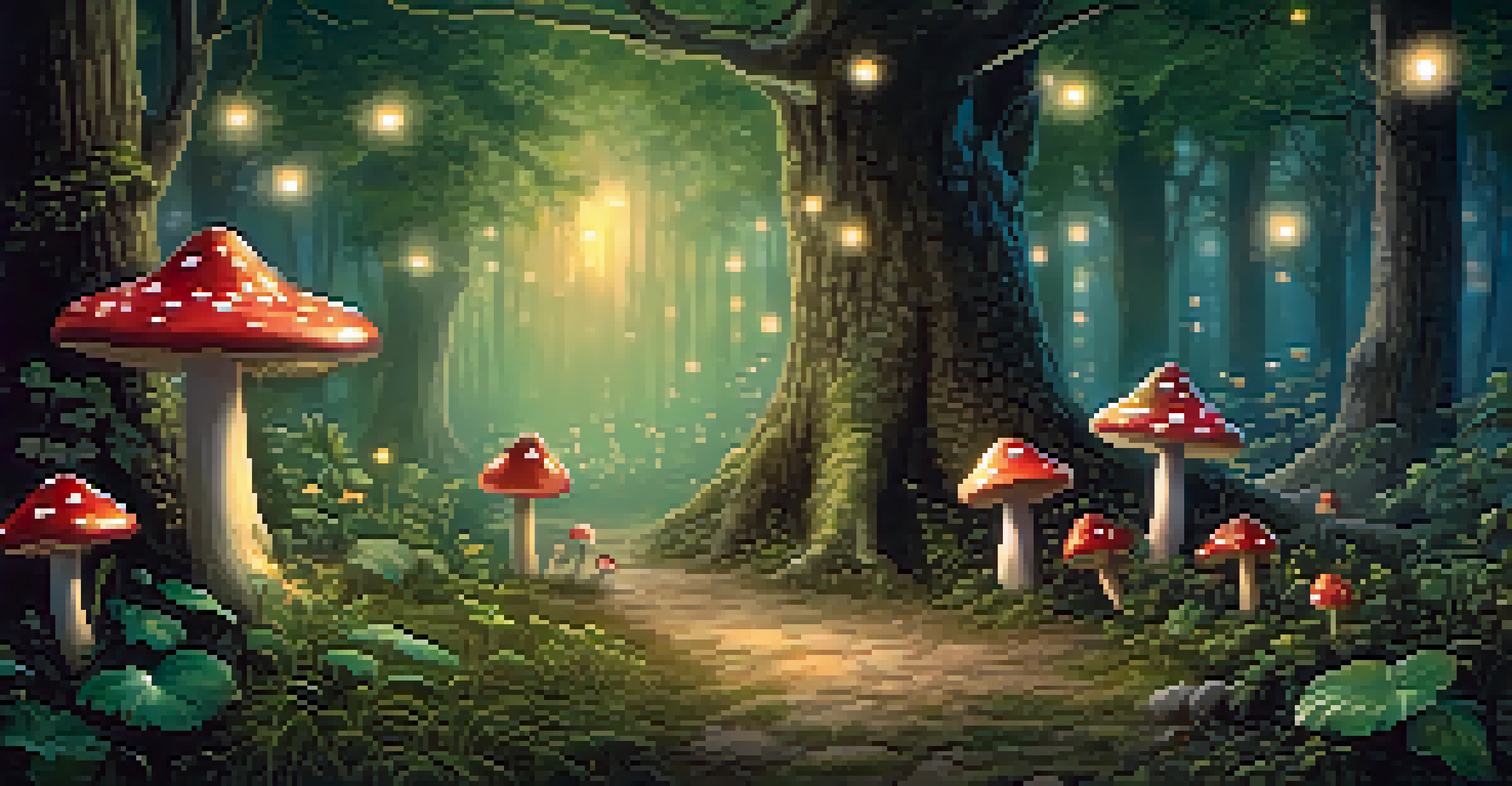Mushrooms in Cultural Folklore and Spirituality

The Mystical Allure of Mushrooms in Folklore
Mushrooms have long captivated human imagination, appearing in myths and legends worldwide. From ancient tales of the mushroom kingdom in Norse mythology to the enchanting stories of fairies in Celtic folklore, these fungi often symbolize mystery and magic. Their unique shapes and vibrant colors make them seem otherworldly, contributing to their association with the supernatural.
Mushrooms are the earth's great recyclers, as they consume decaying material and turn it into life.
In many cultures, mushrooms serve as a bridge between the earthly and the divine. For instance, the Amanita muscaria mushroom, known for its striking red cap and white spots, has been linked to shamanistic practices among Siberian tribes. These mushrooms are believed to facilitate communication with spirits, reflecting the deep-rooted belief that nature holds secrets waiting to be unveiled.
As we delve into various traditions, it becomes clear that mushrooms often represent transformation and the unknown. Their rapid growth and ability to thrive in decaying matter symbolize rebirth and renewal, making them powerful motifs in folklore narratives. This enchanting duality continues to inspire artists and storytellers, reinforcing the idea that mushrooms are more than just food—they are a gateway to deeper understanding.
Mushrooms as Symbols of Healing and Growth
Many cultures have viewed mushrooms as symbols of healing, both physically and spiritually. In traditional medicine practices, such as those found in Chinese herbalism, mushrooms like reishi and shiitake have been celebrated for their health benefits. These fungi are thought to boost immunity and promote longevity, intertwining physical healing with spiritual well-being.

Spiritual growth is another theme connected to mushrooms in cultural contexts. For indigenous peoples in the Americas, the use of psilocybin mushrooms in sacred rituals represents a journey toward enlightenment and self-discovery. These experiences are meant to foster connections with nature, leading participants to insights about their lives and the universe.
Mushrooms as Symbols of Transformation
Mushrooms symbolize transformation and renewal across cultures, representing the journey of self-discovery and growth.
The idea of growth is often visually represented by mushrooms sprouting from the forest floor, reminding us of the importance of nurturing our own spiritual journeys. Just as mushrooms thrive in diverse environments, individuals can find healing and growth in various life experiences. This metaphor resonates deeply across cultures, showcasing the universal quest for well-being.
The Role of Mushrooms in Shamanistic Practices
Shamanistic practices around the world have incorporated mushrooms as tools for spiritual journeys. In these traditions, shamans use mushrooms to enter altered states of consciousness, allowing them to heal and guide their communities. This practice is not only about the individual experience but also about collective healing and understanding.
The mushroom is the most mysterious of all living things, a master of adaptation and a symbol of transformation.
The use of magic mushrooms, particularly in Mesoamerican cultures, has been well-documented. The Aztecs referred to them as 'teonanácatl,' or 'divine mushroom,' believing they contained the essence of the gods. This sacred view elevates mushrooms beyond mere substances; they are considered conduits for divine wisdom and insight.
In modern times, there's been a resurgence of interest in shamanistic practices, with many seeking out these experiences for personal growth and healing. The dialogue around psychedelics and mental health has ignited curiosity about how mushrooms can enhance spiritual exploration. This evolution highlights a growing recognition of the interconnectedness of mind, body, and spirit.
Mushrooms in Eastern Spiritual Traditions
In Eastern spirituality, mushrooms have held significant meaning, particularly in Buddhism and Taoism. Certain mushrooms are revered for their role in meditation and mindfulness practices, believed to enhance spiritual awareness. This highlights the delicate balance between nature and spirituality that many Eastern philosophies emphasize.
The Lingzhi mushroom, for instance, is highly regarded in traditional Chinese medicine and is often associated with immortality. It symbolizes the quest for eternal life and harmony, aligning with the broader spiritual goals of balance and enlightenment found in Eastern traditions. This connection underscores the cultural importance of mushrooms beyond their physical properties.
Mushrooms in Spiritual Practices
Mushrooms are integral to shamanistic and spiritual traditions, facilitating healing and deeper connections with nature.
Moreover, the integration of mushrooms into spiritual practices reflects a holistic approach to well-being. By acknowledging the natural world's gifts, practitioners cultivate a sense of gratitude and interconnectedness. This perspective encourages individuals to explore their spirituality through nature, fostering a deeper appreciation for the environment.
Mushrooms in Western Folklore and Fairy Tales
In Western folklore, mushrooms often appear in fairy tales and children’s stories, embodying enchantment and whimsy. The classic image of a toadstool, often depicted as a fairy's seat, reflects the cultural belief in the magical properties of mushrooms. These tales evoke a sense of wonder and curiosity, inviting readers to explore their imagination.
One iconic example is the story of Alice in Wonderland, where a mushroom plays a pivotal role in Alice's transformation. This whimsical portrayal captures the essence of mushrooms as catalysts for change, symbolizing the journey of self-discovery and the fluidity of identity. This narrative resonates across generations, showcasing the enduring appeal of mushrooms in storytelling.
Additionally, the association of mushrooms with fairies and mythical creatures has fostered a rich tapestry of cultural imagery. These narratives often emphasize the importance of respecting nature and its mysteries, reminding us of our connection to the world around us. As a result, mushrooms continue to inspire creativity and imagination in art and literature.
Mushrooms and Environmental Spirituality
In recent years, the concept of environmental spirituality has gained traction, with mushrooms taking center stage. As guardians of the forest ecosystem, fungi play a crucial role in decomposition and nutrient cycling, embodying the interconnectedness of life. This understanding fosters a spiritual appreciation for nature, encouraging people to see mushrooms as symbols of sustainability.
Many environmental movements emphasize the importance of protecting natural habitats, with mushrooms representing resilience and regeneration. For instance, mycelium—the underground network of fungi—acts as a vital communication system within ecosystems, reminding us that everything is interconnected. This perspective encourages a holistic view of our relationship with the planet.
Environmental Spirituality and Mushrooms
Mushrooms embody the interconnectedness of life, highlighting the importance of sustainability and environmental stewardship.
Furthermore, the rise of foraging culture has led many to explore the spiritual significance of mushrooms in their local environments. By engaging with nature through foraging, individuals cultivate a deeper understanding of their surroundings. This practice not only honors the gifts of the earth but also nurtures a sense of responsibility toward environmental stewardship.
Contemporary Interpretations of Mushrooms in Spirituality
In today's world, mushrooms have found new life in contemporary spiritual practices, particularly within the realms of wellness and mindfulness. The growing popularity of psilocybin retreats showcases a modern approach to spiritual exploration, with participants seeking healing and transformation through guided experiences. This trend reflects a shift in how society views mental health and spirituality.
Furthermore, the integration of mushrooms into holistic lifestyles emphasizes their importance as symbols of connection and unity. As people seek to reconnect with nature, mushrooms serve as reminders of the simple yet profound lessons that the natural world offers. This resurgence of interest highlights a collective longing for deeper meaning in our lives.

As we navigate a rapidly changing world, the spiritual significance of mushrooms continues to evolve. They remind us of our roots, both in nature and in the shared human experience. Whether through storytelling, foraging, or spiritual practices, mushrooms invite us to explore the rich tapestry of culture and spirituality that surrounds us.